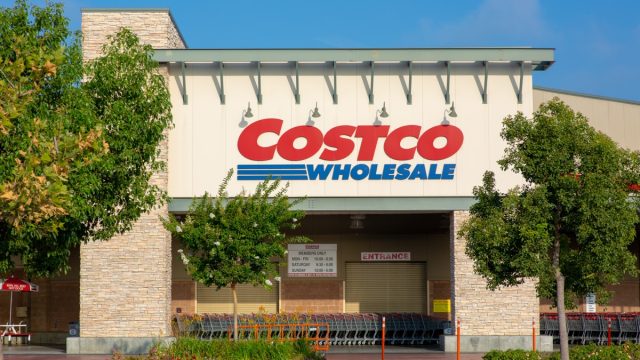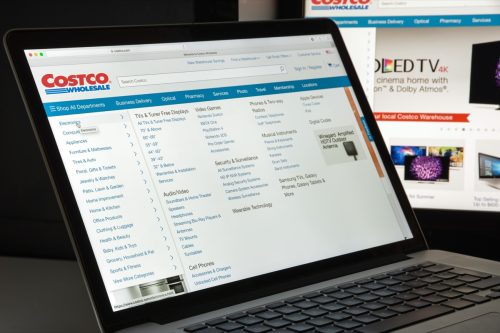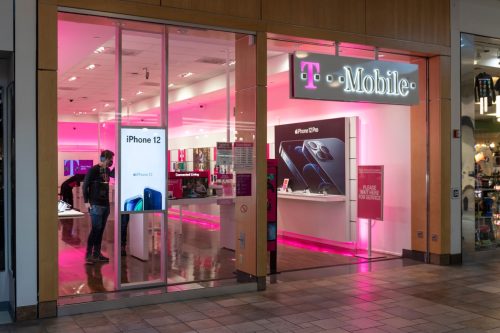If You Get This New Email From Costco, Delete It, Experts Warn
This message with an attractive offer is actually a scam.

More than 100 million people in the world pay for a Costco membership each year, largely because the wholesale retailer tends to provide the most bang for your buck with bulk shopping. The company also sends exclusive offers to members, but don't let your eagerness for the best deals put you in harm's way. While you're scouring your inbox for the latest promo, you could end up falling for a scam. Experts are now warning that shoppers should delete a new email claiming to be from Costco if they receive it. Read on to find out what you should keep an eye out for in your inbox.
RELATED: If You Get an Email From the USPS With These 3 Words, Don't Click on It.
Some shoppers have recently received joint emails from Costco and T-Mobile.

If you've received an email from Costco and T-Mobile in the last month or so, you're not alone. Snopes, a fact-checking website, reported on Feb. 10 that it had reviewed multiple emails recently sent, claiming to be from both companies. The messages promise a "gift" or "exclusive reward," with a subject line that usually reads "We have been trying to reach you—Please respond!"
According to Snopes, two of the "exclusive reward" emails they reviewed were marked with the Costco name and pink T-Mobile coloring. "Congratulations! You have been selected to get an exclusive reward from Costco and T-Mobile," the body of these messages says.
But these emails are from scammers.

Costco and T-Mobile have not teamed up for an exclusive email giveaway. According to Snopes, any message claiming to be from the two companies is a scam. The links provided in the emails reviewed led to a British internet domain, which then redirected to a Russian website.
"On this page, users were then told they could receive a $100 Costco gift card for taking a survey. However, this was also part of the scam," Snopes explains. A Florida mailing address was included at the bottom of the fraudulent emails as well, but it has no affiliation with either of the companies. And Snopes said it has also seen this address at the end of messages in similar scams for businesses like Lowe's and UPS.
"In sum, we recommend that readers delete any emails that claim to be from both Costco and T-Mobile that promise an 'exclusive reward,'" the fact checking site advises. "These were not official messages from either company."
RELATED: For more news on retail scams, sign up for our daily newsletter.
Costco recommends that shoppers not click on links from emails.

Scammers consistently try to target victims by fraudulently posing as various retailers. "It is an unfortunate fact of the Internet that at any given time there are numerous illegitimate pop-up ads, surveys, websites, emails, social media posts and advertisements that purport to be from or authorized by Costco," the company warns on its website. "It is unlikely that Costco is affiliated with these promotions."
Costco says it will never send unsolicited electronic communications that ask for a user's personal information like their username, password, credit card information, birth date, or Social Security number. One of the first things you should when receiving a "Costco" email is check to see who sent it, as verified messages won't include typos and misspellings and will have an address that ends with @costco.com.
But if you're not sure of the email's legitimacy, there are ways to make sure you're protected no matter what. "Enter websites using your browser and not by clicking on provided links," Costco recommends, adding that you should never respond to emails that cannot be verified, and never provide personal information through email.
T-Mobile has also warned customers about scam emails.

Scammers will try to pose as certain phone providers, like T-Mobile, as well. T-Mobile said that it is common for fraudsters to send an email that appears to be from the company in order to trick them into providing personal information directly or by visiting a phishing link.
"T‑Mobile will never ask you to confirm or verify your sensitive personal information in an unsolicited e-mail," the phone provider warns. "Never confirm or verify your sensitive personal data or account information in response to an unsolicited e-mail, text, or inbound call … You should only provide such information to T‑Mobile or any other account provider when you have initiated the contact to a known, reliable contact number or address."
RELATED: If You Get This Message From Netflix, Delete It Immediately, FBI Warns.





















